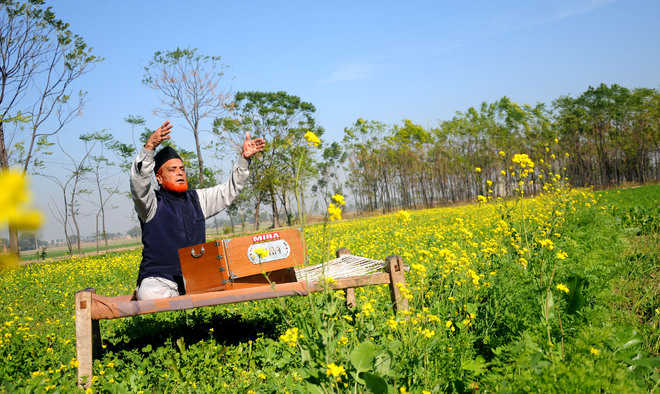Amarjot Kaur
If the Partition wouldn’t have forced his family to move to Faisalabad, Pakistan, the legendary Nusrat Fateh Ali Khan might have sung his first qawwali in Jalandhar. While Nusrat took the mystical songs of Sufism to the Western World, this genre of devotional music suffered the blows of indifference on this side of Punjab.
It still survives, though, at melas and dargahs, and in families that trace their roots to the ‘spiritual’ vocation to as far back as seven generations. It even makes a rare, obligatory appearance at government-supported events. There are takers for private performances too, but they are few and far between.
Faced by rising expenses and falling demand, most qawwals have found other ways to make ends meet: while some have opened music academies, one has fallen back on selling bathroom fittings.
Ancestral heritage
From Malerkotla’s Mubarakpur Chunga Gharana, 75-year-old Ustad Saleem Qawwal first performed at the age of 18. His son, Mohammad Rafi (42), says their ancestors would sing in the king’s court. “The Nawab of Malerkotla gifted them a piece of land. I’m a seventh-generation qawwal,” he says. “Four of my grandfather’s brothers went to Pakistan after Partition, but he stayed back. We were famous for singing the story of Heer. We charge Rs 10,000 a show, and perform 4-5 times in a busy month. We don’t like to associate ourselves with government-funded shows because our tie-ups with dargahs are sacrosanct, and trace back to our ancestors.”
The devout
Aged 52, Shokat Ali Diwana comes from the Patiala Gharana. With 30 years of experience, he has sung across India and is registered with North Zone Cultural Centre. “Qawwali begins where music ends. It’s the pain of God; not everyone can sing it. I perform at weddings and birthday parties, but I enjoy singing at mazaars the most; it’s where my soul feels one with music,” he shares.
Heading a nine-member qawwali party, Diwana also runs a music academy. “I started Diwana School of Music in Patiala three months ago, but I have always been teaching. Kamal Khan, a winner of the TV show Sa Re Ga Ma Pa, was my student. Kids like to fuse qawwali with other forms of music, but I can’t do it. For me, qawwali is divine,” he justifies.
Diwana says May, June and July are the busiest months. “We get two-three shows in a day during this time. Otherwise, we perform twice or thrice in a month. Sometimes, we charge as less as Rs 5,000 or perform free of cost at dargahs,” he adds.
Not the same
Karamat Faqir, 71, remained in India after Partition, while his elder brother went to Pakistan. Apart from releasing three albums (Ishq Wali Satt, Jogi Nikka Jeha, and Ravidas Tere Dar Te), Karamat has also sung a qawwali, Ishq Nahi Darda Mohabbat Ton, in Gurdaas Maan starrer Shaheed-e-Mohabbat. In Malerkotla, he has been singing since the age of 15. “Earlier, we were invited to mushairas, where people understood Urdu and parts of Arabic. Now, people ask for Punjabi folk songs. It’s different in Pakistan. Qawwals get a good audience and a proper ambiance for mehfil-e-sama,” he says.
Chandigarh’s only two
Bittu Qawwal
Ram Darbar’s Bittu Qawwal, 52, has been singing since he was 18 years old. “Our qawwali gharana is from Punjab’s Malerkotla. Baged Saab Diwana taught me and Mohammad Shareef Qawwal was my raj guru.”
Joined in by his 20-year-old son, Bittu sings with a party of 10 people. For each sama (session of qawwali), he charges Rs 15,000 for three hours. “We get invited for parties, but we sing at dargahs mostly, sometimes even for free. In a good season, I end up making more than Rs 20,000, but there are bad days too. For making money on the side, I have a shop of bathroom fittings and furnishings,” he says.
With more than 150 qauls, written by his ancestors, gurus, and some from the traditional poetry of the Chisti order, Bittu defines Sufi poetry as ‘spiritual’ in its meaning. “In Punjab, there aren’t many takers for qawwals who sing in Urdu and Farsi, unlike UP’s Kanpur, or even Pakistan. New-age qawwali sounds like gidda.”
Neele Khan
Neele Khan (55), who hails from Nabha’s Lalauda village, has been in Chandigarh since 2004 and performed at the recent Craft’s Mela in Kalagram. He teaches music at Government Model Sanskriti Senior Secondary School in Panchkula’s Sector 20 and runs a music academy, Sur Sangeet Academy, in Zirakpur’s Badal Colony. “I get many gigs; not only from NZCC, but also from ICCR. In fact, I have performed in Europe, Dubai, and Singapore.”
Coming from the Patiala Gharana, Khan believes there’s a need to reinvent qawwali, like Nusrat Fateh Ali Khan did. “I am a fourth-generation qawwal and have 35 years of experience,” he says. Khan says the government pays between Rs 30,000 and Rs 40,000 for a mehfil-e-sama, but dargahs limit the payout to Rs 15,000. “Imagine dividing it between 10 people, when the leader takes the share of two people. Thankfully I have a job, but there are many who don’t make enough, especially as no one is promoting these artistes.”
amarjot@tribunemauil.com
Unlock Exclusive Insights with The Tribune Premium
Take your experience further with Premium access.
Thought-provoking Opinions, Expert Analysis, In-depth Insights and other Member Only Benefits
Already a Member? Sign In Now










